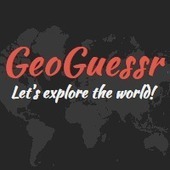"Explore ten 'big ideas' that encapsulate the technological and social trends that have pushed geographic information systems (GIS) onto the Internet in a significant way. See how to apply these ideas to your own world. Open your eyes to what is now possible with Web GIS, and put the technology and deep data resources in your hands via the Quickstarts and Learn ArcGIS lessons that are included in each chapter."
Get Started for FREE
Sign up with Facebook Sign up with X
I don't have a Facebook or a X account

 Your new post is loading... Your new post is loading...
 Your new post is loading... Your new post is loading...
|

Matleena Laakso's curator insight,
October 5, 2014 4:55 AM
Tämä on hauska, muutaman kerran on tullut "pelattua". 
Alex Smiga's curator insight,
September 7, 2015 4:36 PM
Cool game that drops you down somewhere random in the world on street view, then asks you to guess where in the world you are 
Christopher Galindo's curator insight,
September 3, 2023 10:07 PM
Una herramienta muy divertida para enseñar a los alumnos acerca de la geografía del mundo. Este juego utiliza los mapas de Google para mostrar lugares icónicos que los estudiantes reconocen y los reta a ubicar en un mapa dónde están localizados.
#Geografía #Mapas #Secundaria #Gamificación
Alyssa Dorr's curator insight,
December 16, 2014 9:54 PM
For starters, these pictures were fascinating to look at. It was amazing to see how much time and effort goes in making just one map. The video was informative and really gives you an idea of the unique process that is being done. The pictures fascinated me the most though. You could just tell just by looking at the pictures that they take what they do seriously. Also, you can tell that they are passionate about what they do. You can especially tell that you yourself had a great time and that you were really interested in what was going on. It is really awesome that National Geographic interviewed you about your visit. In the video, it was nice that he started off with some background information about Cuba and the special times that he shared with his father that made him go into cartography. Overall, the pictures and the video were really a sight to see.
Jared Medeiros's curator insight,
February 11, 2015 10:11 PM
This was a great presentation. I cant imagine how long it must take to make an accurate map, especially when these cartographers are so passionate about their work and their craft. You can tell that to be a cartographer, you must be extremely passionate and dedicated to your craft. 
Rachel Phillips's curator insight,
April 16, 2015 4:58 PM
It's absolutely crazy to be that Juan Valdes had up to thirty-six different drafts of the map of Cuba, just to come up with the one, most accurate map of the country. When I see maps, I never think of how long it must have taken to get it exactly the way it is to be the most accurate map possible. It also makes me wonder how completely accurate our maps are, because when comparing multiple, you can see slight differences. |














I haven't fully previewed this online textbook yet but I am VERY optimistic about this one from the ESRI library. You can also download the textbook as a PDF here. There are several other online textbooks that would interest geography teachers
Tags: GIS, ESRI, mapping, cartography, geospatial, edtech, geography education, unit 1 GeoPrinciples, textbook.